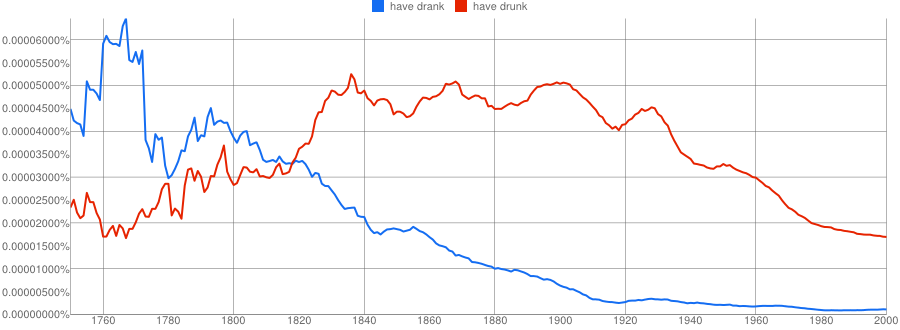Ok, so as an English teacher, I know that in the present and past perfect tenses, the auxiliary verb have is followed by the past participle form of the verb.
Using most verbs, I find that this is true for all sentences I have heard. However, on several instances, I have run into a native speaker using the past form of the verb (drank) where the grammar calls for the past participle (drunk).
For example: "I hadn't drank any coffee before I lived in Italy."
According to grammar norms, this sentence should be: "I hadn't drunk any coffee..."
More and more, I noticed that people tend to use drank instead of drunk after perfect aspect constructions. This construction was used across all communities of practice and wasn't subject to dialect boundaries.
According to results from http://www.phras.in, have drank and have drunk are clear, with the standard have drunk being 4x more prevalent than have drank. However, with an instance rate of about 200,000 for the non-standard form, that is nothing to scoff at. However, the opposite was true with the negative form haven't drank vs. haven't drunk with the non-standard being almost twice as prevalent.
EDIT: As for the dialect variant idea, I have researched into the various dialectal changes involving the past participle. Most constructions involving the variant are indicated to be dialectal or just plain bad grammar. However, when I started hearing it from people from the UK, this is when I started asking questions. Looking into it further, I have found some linguistic research papers involving corpora and frequency analyses of this phenomena and have found that there is definitely a shift among non-standard verbs to use the past instead of the participle for perfect aspect. At least according to the BNC and COCA. This is usually with germanic-root words such as bid/bade/bid, drink/drank/drunk, bit/bit/bitten.
So, my question, then, is whether or not there is some sort of construction that is the exception for this particular situation, i.e. some construction where perfect tense does not use past participle after the aux. verb, or if this is simply some crazy, non-standard phenomenon with the verb drink in the perfect tense.

